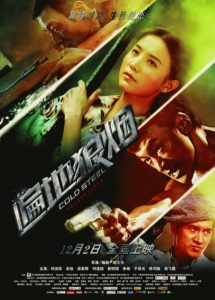Cold Steel
遍地狼烟
China, 2011, colour, 2.35:1, 101 mins.
Director: Hu Dawei 胡大为 [David Wu].
Rating: 5/10.
Routine, solidly made war drama with a professional cast.
Hubei province, central China, 1938, during the Sino-Japanese War. In the woods one day, orphaned hunter Mu Liangfeng (He Rundong), 19, sees a plane crash nearby and rescues the US pilot, John (Jonathan Kos-Read). Helped by war widow Liu Yan (Song Jia), he has John taken to the nearby town Wind Chime Crossing, where he recovers in a temporary hospital in a teahouse owned by her. After defending Liu Yan from some brutish soliders in the Nationalist Army, Mu Liangfeng is arrested by their commander, Wu (Ye Xinyu), and transported to their camp. En route, the convoy is attacked by Japanese snipers and only escapes thanks to Mu Liangfeng’s markmanship. At the camp, Mu Liangfeng is tested by the regimental commander (Yu Rongguang) and then forced to “volunteer” for the army’s 204 Sniper Unit, which is ordered to create a diversion in the city of Jingzhou to slow up the advancing Japanese army. The operation, led by veteran platoon leader Zhang Mengzi (Liang Jiahui), is to assassinate four Japanese generals and their Chinese interpeter; but it doesn’t go to plan, and ends with the squad barely escaping with their lives. The ruthless local Japanese commander, Masaya (Guo Mingxiang), orders in his own snipers to hunt them down. Meanwhile, Liangfeng starts a romance with Liu Yan. As the Japanese continue to advance, the army retreats and re-assigns the sniper unit on a mission to blow up the broadcasting station at the Japanese prisoner-of-war camp in Changde. Masaya’s fiancee, nurse Ryoko (Zhu Ling), happens to be working at that very POW camp.
REVIEW
After a long spell directing TV series and movies in North America, veteran Hong Kong editor and frequent Wu Yusen 吴宇森 [John Woo] collaborator Hu Dawei 胡大为 [David Wu] returns to big-screen directing for the first time in 17 years with Cold Steel 遍地狼烟, his first Mainland production in Mandarin. A commercial journeyman who’s done everything from Canto-comedies (From Zero to Hero 乱世超人, 1994) to costume action fantasies (The Bride with White Hair 2 白发魔女2, 1993), Hu – not to be confused with Chinese American actor Hu Dawei 胡大维 [David Wu] – delivers a standard Sino-Japanese war movie, which looks exactly like what it is: a condensed version of a hugely popular online novel (2009) to book (2010) by young writer Li Xiaomin 李晓敏 that was also simultaneously shot as a TV drama series (broadcast from late Dec 2011) by a different crew and cast.
Wu’s film version moves snappily along, and has a likeable lead in US-born, Taiwan-raised actor He Rundong 何润东 [Peter Ho] – the screen partner of Zhang Ziyi 章子怡 in hit rom-com Sophie’s Revenge 非常完美 (2009) – as a young hunter who’s forced to become an army sniper, plus older acting ballast from China’s Yu Rongguang 于荣光 and Hong Kong’s Liang Jiahui 梁家辉 [Tony Leung Ka-fai] as grizzled army veterans. As the teahouse-owning widow whom He’s headstrong young character falls for, Song Jia 宋佳 (aka Xiao Song Jia 小宋佳, the mistress in whodunit Curiosity Kills the Cat 好奇害死貓, 2006) is agreeably low-key but sounds rather flat, and is almost cast into the shade in some scenes by perky Wu Feixia 吳飛霞 [Angeles Woo, daughter of John] as her bumpkin employee. The film finally generates some tension in a night-time standoff between He’s hunter and the maniacal Japanese colonel of Guo Mingxiang 郭明翔 – largely thanks to Hu’s editing. Otherwise, it’s a routine, solidly made war drama with okay action sequences but little psychological depth in its tight running time.
The film’s English title is not especially apt for a movie about snipers. The better Chinese title roughly means “Smoke and Fire Everywhere”.
CREDITS
Presented by HG Entertainment (CN).
Script: Hu Dawei [David Wu]. Novel: Li Xiaomin. Photography: Huang Yongheng [Horace Wong]. Editing: Hu Dawei [David Wu]. Music: Lawrence Shragge. Art direction: Zhong Zhipeng. Costume design: Chen Gufang [Shirley Chan]. Sound: Lin Zhi’en, Wu Ling, Zhu Yanfang. Action: Yang Deyi . Special effects: Wei Xincai. Visual effects: Lee In-ho, Kay Kim (Macrograph).
Cast: He Rundong [Peter Ho] (Mu Liangfeng), Song Jia (Liu Yan), Liang Jiahui [Tony Leung Ka-fai] (Zhang Mengzi, platoon leader), He Shengming (Xiaowu), Guo Mingxiang (Masaya, colonel), Yu Rongguang (regimental commander), Zhu Ling (Ryoko, Japanese nurse), Chen Sihan (Gui), Wu Feixia [Angeles Woo] (Er Wa, Liu Yan’s employee), Chen Changkuang (Xiaobin), He Zimeng (Tian), Liu Zhonghu (Lao Ma), Yang Deyi (Yang), Li Wei (Xiaoshun), Jonathan Kos-Read (John, US pilot), Ye Xinyu (Wu, commander), Liao Xi (platoon sergeant), Yang Jiahua (young boy), Li Linlin (mother), Liu Guanghou (He), Zhou Jiwei (Pao), Wang Deshun (Mu Liangfeng’s grandfather), Shao Haotai (Xiaomu), Tao An (Xiaofang), Wang Weihua (Tang Songshan, general, Liu Yan’s husband), Li Cong (Bing Youzi), Yan Chunzhu (Dahai), Xing Wenjia (Lin, interpreter).
Release: China, 2 Dec 2011.
(Review originally published on Film Business Asia, 4 Jan 2012.)
